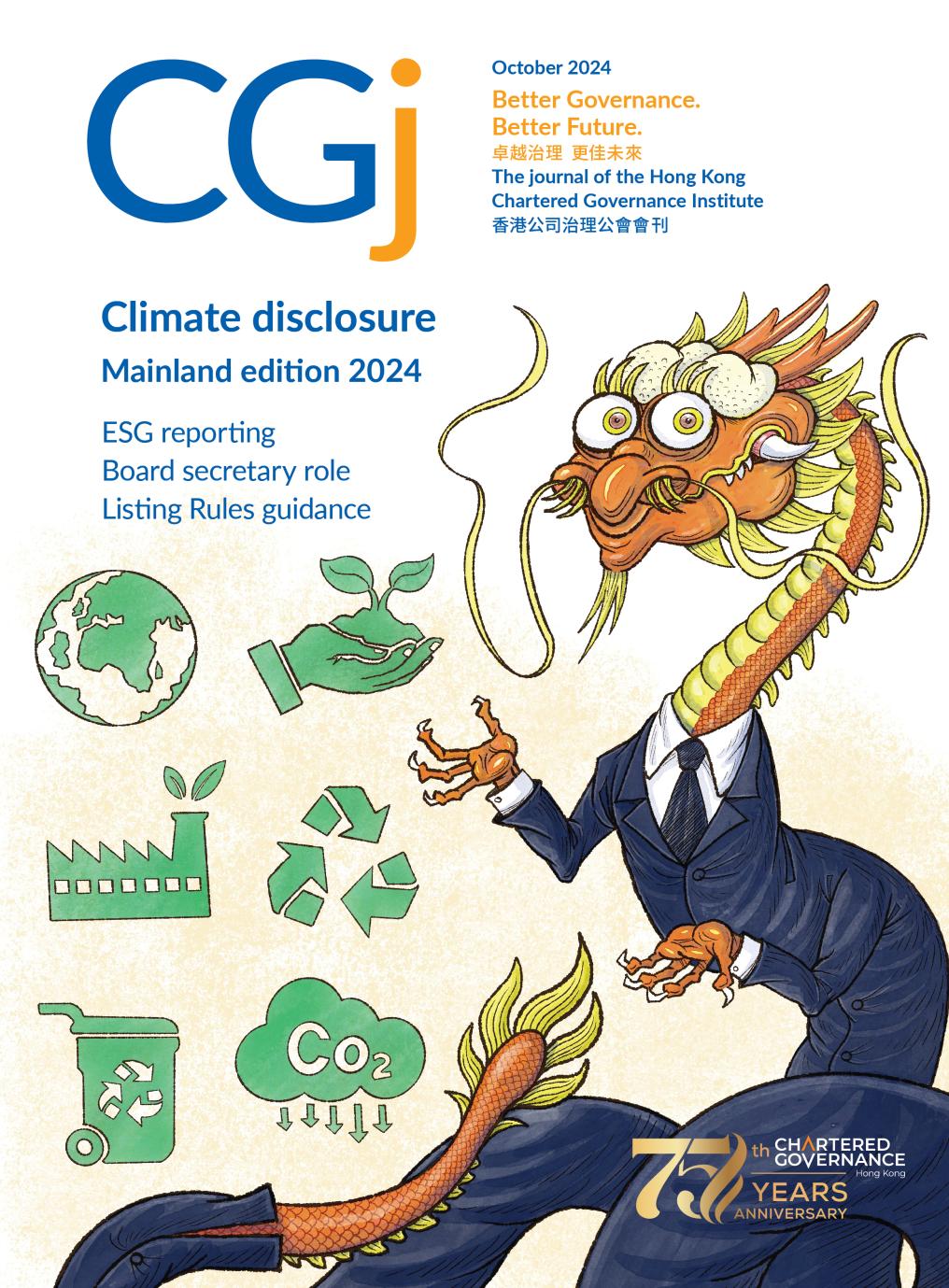
Obtaining professional qualifications
Two board secretaries share their route to qualification, as well as their career development and views on the prospects for governance practitioners in the Chinese mainland.
Highlights
- the Institute’s professional qualifications enable board secretaries to gain a deeper awareness of corporate governance issues and broaden their knowledge of a wide range of subjects, including in the legal, financial, regulatory and communication spheres
- a board secretary serves as a bridge between the company and its stakeholders, and helps management understand the regulatory requirements of a listed company, as well as the expectations of shareholders and investors
- more external professionals – such as investment bankers, and partners from law or accounting firm – are taking on the board secretary role, indicating the growing trend towards greater professionalisation of the governance arena in the Chinese mainland
Andy Li ACG HKACG, Board Secretary and Company Secretary, Tong Ren Tang Technologies Co Ltd
Tong Ren Tang Technologies (Stock Code: 1666 HK) is a China-based company mainly engaged in the manufacture and sale of traditional Chinese medicine products and healthcare products.
Andy Li (Li Yijun) has been a governance professional for over 18 years. He currently serves as Board Secretary and Company Secretary of Tong Ren Tang Technologies. The Tong Ren Tang Group has a unique structure, with three listed companies under its umbrella. The company where Mr Li works is listed on the Hong Kong Stock Exchange, with a parent company listed on the Shanghai Stock Exchange and a subsidiary listed in Hong Kong.
This structure brings significant complexity to Mr Li’s work. He needs to comply with both the Shanghai and the Hong Kong listing rules. Additionally, because the parent company holds more than a 30% stake in the subsidiary, many business decisions involve connected transactions. As Mr Li pointed out: ‘If our Hong Kong subsidiary has a transaction that needs to be disclosed, all three companies must hold shareholder meetings. Holding three shareholder meetings for one business decision is extremely rare among listed companies in both the Chinese mainland and Hong Kong.’
To navigate the complex corporate structure and disclosure requirements, a board secretary must have a solid foundation in finance and law, along with strong communication and coordination skills, said Mr Li. ‘A board secretary is not just part of the legal or public relations departments, he or she serves as a bridge between the company and its stakeholders. The company’s management mainly focuses on operations, but they need someone to help them understand the regulatory requirements of listed companies, as well as the expectations of shareholders and public investors.’ The board secretary should fulfil this particular role, and should be responsible for communicating the requirements and demands of regulatory bodies, shareholders and the public.
“to navigate the complex corporate structure and disclosure requirements, a board secretary must have a solid foundation
in finance and law, along with strong communication and coordination skills”
Andy Li ACG HKACG
Board Secretary and Company Secretary, Tong Ren Tang Technologies Co Ltd
‘A board secretary needs to think from multiple perspectives,’ Mr Li said. ‘When communicating with different groups, even if you are discussing the same issue or aiming for the same goal, the board secretary should adopt different communication strategies. For example, what a deep value investor focuses on may differ from what a growth-orientated investor cares about. Moreover, when communicating externally, the board secretary must be able to explain the company’s investment value and quickly summarise the company’s metrics.’
Mr Li described how, by enrolling in one of the Institute’s Collaborative Course Agreement programmes and obtaining the dual qualification of Chartered Secretary and Chartered Governance Professional, he gained a much deeper awareness of corporate governance and a better grasp of Hong Kong’s Listing Rules, which enabled him to more quickly identify governance issues in listed companies, as well as key points of cross-border compliance. ‘The qualification was very helpful in giving me a fuller picture of global corporate governance theories and challenges, and a greater comprehension of relevant cases.’ The dual qualification also helped him master corporate finance skills, allowing him to link the company’s sustainable development with market value management.
Mr Li mentioned that, for many mainland candidates, language is a barrier to obtaining the Institute’s professional qualification, but he encourages everyone not to be intimidated by the English-language examinations. ‘The core of a board secretary’s work is dependent on having extensive knowledge of corporate governance. Only through systematically studying global corporate governance theories and cases can this knowledge be applied in practice to solve real
problems, as well as to improve corporate governance standards.’
Regarding the future of the industry, Mr Li believes that the demand for governance professionals will only increase. He pointed out that the State Council of the People’s Republic of China (PRC) has stepped up its supervision of listed companies in the Chinese mainland, while the new PRC Company Law also puts more emphasis on the responsibilities of the board and its diligence duty. Additionally, the international and domestic consensus on ESG investment is rapidly developing, which will drive demand for corporate governance professionals.
For young people just entering the field, Mr Li advises them to focus on gaining work experience and knowledge within a company. He emphasised that board secretaries are not only responsible for information disclosure, but also for managing investor relations and capital operations, as well as for realising corporate value through the capital market. Especially in situations where there are no prior cases for reference, board secretaries should actively communicate with lawyers and peers to learn from their relevant experience.
Mr Li calls for further recognition of the role of board secretaries within and outside the industry, and expressed his belief that – rather than simply hiring a qualified board secretary as a box-ticking exercise – it is essential for enterprises to fully acknowledge and make use of the value that a board secretary can bring to the role. He explained that while investor education is necessary, corporate education should not be overlooked. Many business people in the Chinese mainland do not fully understand the job of the board secretary, and it is therefore vital to raise awareness and appreciation of this important role.
Lu Hongyu FCG HKFCG, Chief Capital Officer, Board Secretary and Joint Company Secretary of AInnovation Technology Group Co Ltd
AInnovation (Stock Code: 2121 HK) is a Chinese company mainly engaged in the artificial intelligence (AI) business that provides AI solutions for enterprises, including AI platforms, algorithms, software and AI-enabled devices.
Lu Hongyu has extensive experience in company secretarial, legal and compliance fields. She currently serves as Chief Capital Officer, Board Secretary and Joint Company Secretary of AInnovation. She joined the company in early 2024. Before that, she served as the company secretary and board secretary of Kingsoft Corporation Ltd. In addition, she has handled legal compliance, asset restructuring, investment and financing, as well as corporate secretarial duties at an aviation technology company listed in Hong Kong that manufactures aeroplanes and helicopters. She has also worked at a number of law firms as a lawyer.
When asked about her career development, Ms Lu stated: ‘My first job was at a Hong Kong–listed company, which gave me a considerable insight into the Hong Kong Listing Rules and regulations, sparking my interest in a career in corporate governance.’ Although her background was in law, she learned a great deal about corporate finance, business standards and listing rules by taking the Institute’s Chartered Governance Qualifying Programme examinations, thereby enhancing her knowledge of a broad range of subjects.
‘I have a legal background and had some understanding of finance, but that was fairly limited. In preparing for the corporate finance exam, I deepened my understanding of finance, and achieved good results without a financial background, which also showed me that I could work in areas other than just law.’ She shared that obtaining the dual professional qualification of Chartered Secretary and Chartered Governance Professional was also a turning point to enable her to transition into board secretary and company secretary roles.
Ms Lu emphasised that governance professionals should ‘expand their knowledge base as much as possible,’ whilst focusing on one or two specialised areas. She noted that although one should possess professionalism as a foundation, ‘enhancing comprehensive abilities’ is even more important.
‘The role of a board secretary is to create or enhance value through coordination. As a company secretary or board secretary, you cannot rely solely on legal or financial knowledge, you also need diversified skills,’ she said. ‘Compliance and corporate governance are fundamental to the work of a board secretary, but they should also help the company with transactional matters such as mergers, restructuring or value expansion in the capital markets.’
Ms Lu observed that, in Hong Kong, company secretarial work mainly focuses on corporate governance and compliance, whereas in the Chinese mainland, board secretaries take on more tasks concerning capital operation. In the past, many companies preferred promoting known internal candidates to the role of board secretary, but now more external professionals – such as investment bankers, and partners from law or accounting firms – are entering these positions, demonstrating a trend towards professionalisation in the governance field.
Ms Lu is optimistic about the future development of the industry: ‘Looking at the past decade, I think the development in the Chinese mainland has been relatively fast – in recent years, the industry has become increasingly specialised and professional, and demand for the board secretarial role will undoubtedly continue to grow.’
“the development in the Chinese mainland has been relatively fast – in recent years, the industry has become increasingly specialised and professional, and demand for the board secretarial role will undoubtedly continue to grow”
Lu Hongyu FCG HKFCG
Chief Capital Officer, Board Secretary and Joint Company Secretary of AInnovation Technology Group Co Ltd
Hsiuwen Liu
Journalist


